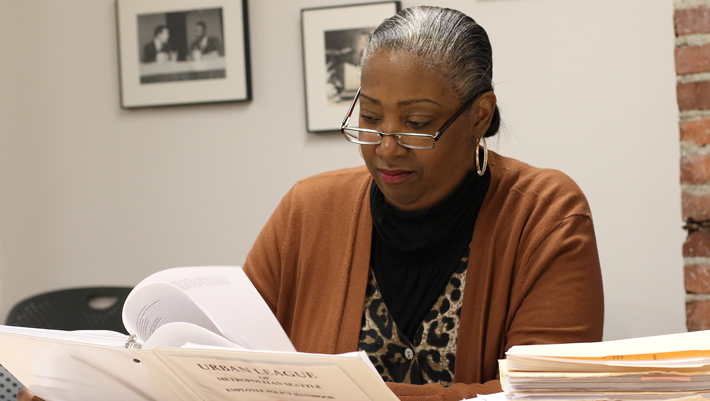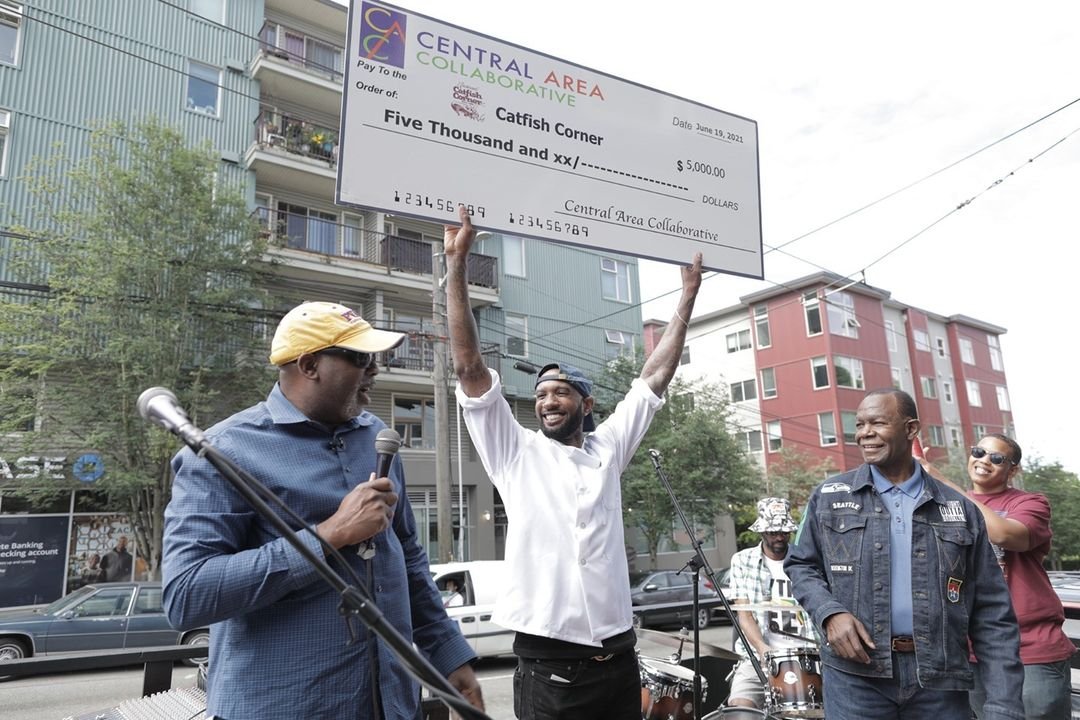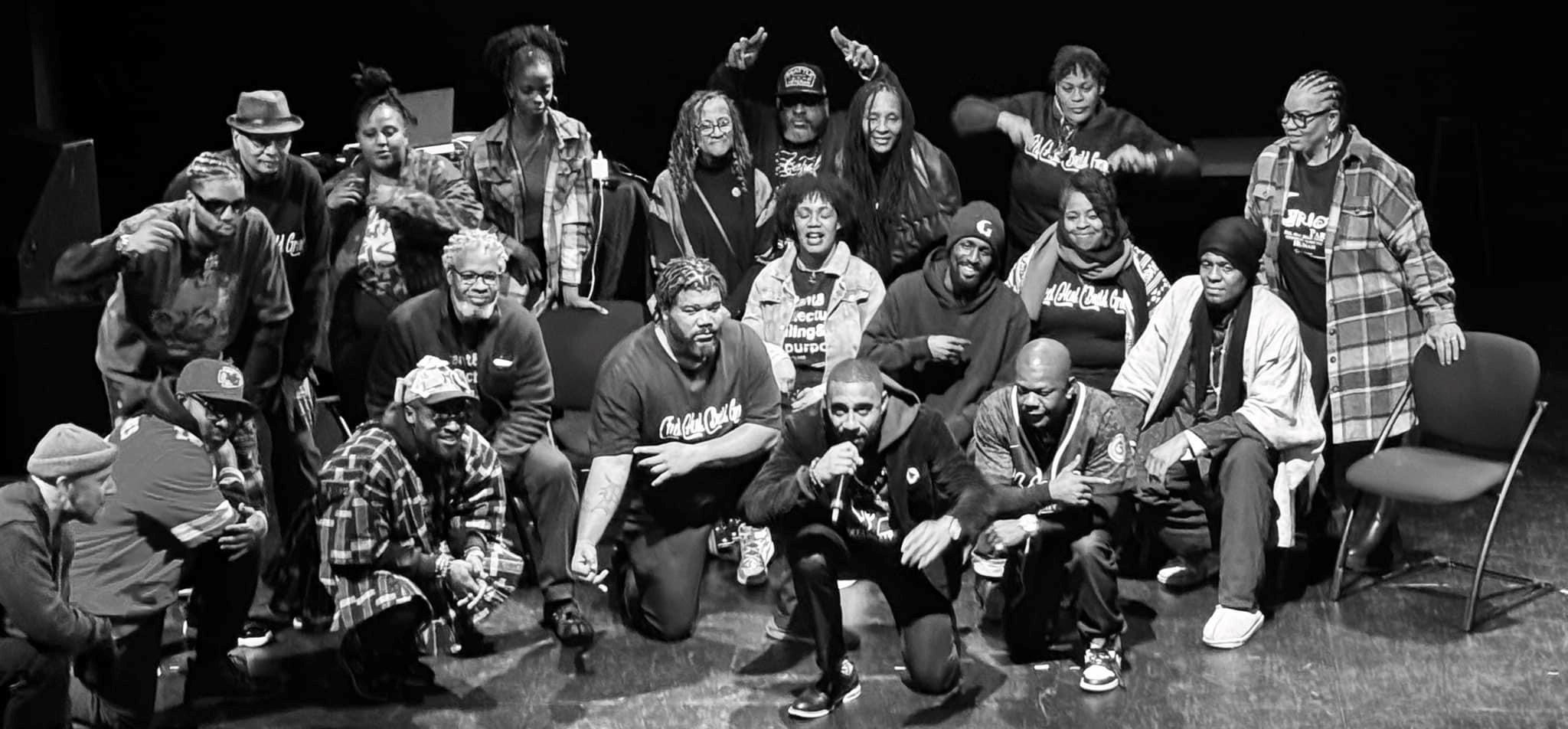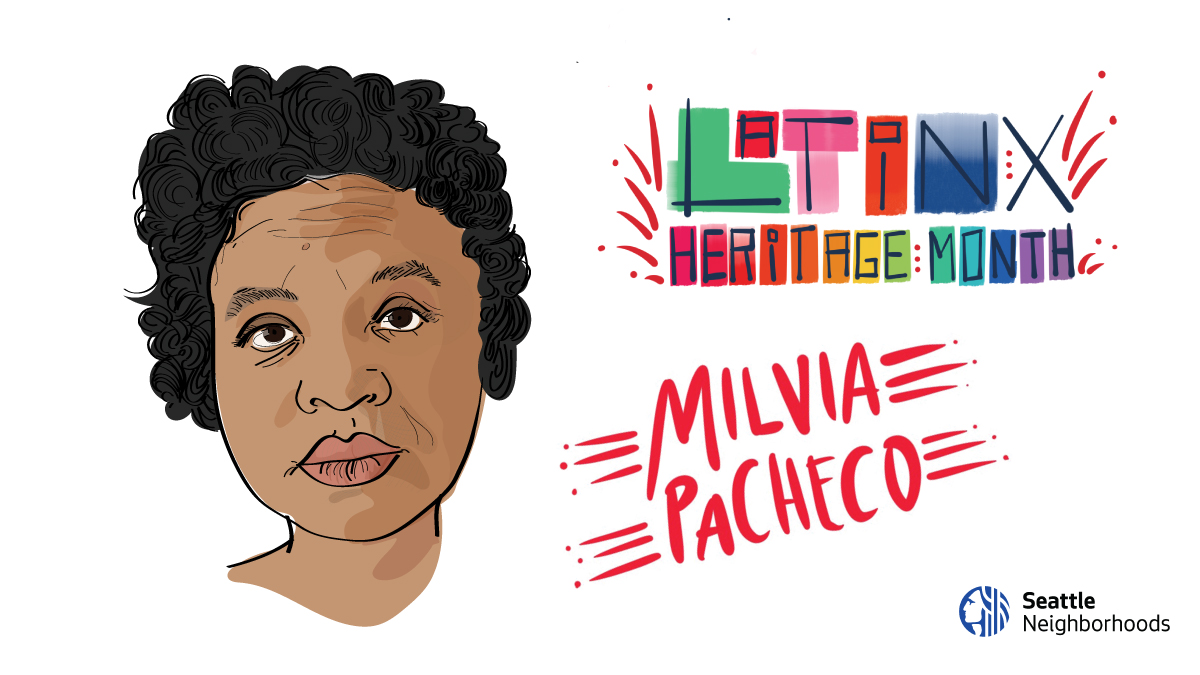
In celebration of Latinx Heritage Month, we are hosting a series of profiles and stories to amplify and honor people, businesses, organizations, and projects connected to Seattle’s Latinx community.
My name is Milvia Berenice Pacheco Salvatierra, I am an Afro Latina artist born and raised in Caracas-Venezuela. Experiences with trauma at an early age fueled in me a pressing drive toward movement. My first brush with the power of movement as a catalyst for healing came during a theater arts project geared toward inner-city youth when I was 13 years old. By the time I was 18, I was sure that healing through movement was my calling. I went on to devote the next years of my life to reaching liberation through art and movement. In this journey, I have become a contemporary dancer, choreographer, performer, body worker and community organizer. My mission is to serve as the conduit for empowerment for myself, my family and for others, using my pressing drive toward art, movement, self-expression, and body awareness as an instrument of healing to reach liberation. Rather than being a victim of the past, I will continue deepening the connection with my roots to facilitate the process of healing and to help the Afro-descendant community to find sustainable ways to share who we are and reclaim an equal rank in our social structure. I am committed to embodying the values of empathy, love, integrity, and collaboration to shape the pathway of this journey of racial equity and personal inner peace. I have been living in Seattle since 2012 where I also became a mother. MÁS (Movimiento Afrolatino Seattle) has become the platform where I continue serving as a conduit for empowerment and beyond empowerment for myself and others.
What is it for me to be of African descent?
For me, naming myself as an Afro-descendant woman has been a process of self-discovery of the non-European cultural essence that inhabits me.
Born and raised in Venezuela, I grew up speaking Spanish as my mother tongue, without understanding in depth that Spanish is actually a language imposed by Spanish colonizers in those territories. Although speaking Spanish is an important part of my identity, which I exercise with pride, which connects me with the history of a territory and with Spanish-speaking communities, which has helped me make sense of the world; it is also obvious that it generates a direct connection with that inheritance imposed by Spanish colonizers. It is not something inherited from my Afro and indigenous ancestors. So to call myself a Black woman or an Afro-descendant woman is to say that I am in search of those languages that I lost; that I recognize that my ancestors understood and named things in different ways and that way of naming them is still present in my body and that I can access them when I turn my gaze to that ancestral knowledge that lies in the oral and cultural traditions of Afro-descendant communities that continue to exist in Latin America.
To say that I am Afro-descendant is to say that I am aware of the cultural diversity that exists in our territories. By naming myself Black, I want to heal in myself the violence exerted by colonial processes that, to this day, continue to promote racial inequity and anti-blackness in our societies. Naming myself as an Afro-Latinx woman helps me understand these intersections, but naming myself Black and Afro-descendant helps me center blackness as a path of reparation and healing. When I say I am Black and from Latin America I also say that I understand that I am part of a social group that suffers from layers of discrimination, due to the strategies of control and legal and institutionalized exploitation in our societies. When I say I am Black and from Latin America, it is because I want to create visibility of my blackness without erasing the historical and contextual relationships that unite me to Latin America and that have provided me with ways of understanding the world as well as ways of being perceived by the world.
Also, when I say that I am a Black woman from Latin America, it is because I want to celebrate and vindicate in myself and in others the value of the drumbeat, the blackness that embraces our bodies and connects us with a deep sense of love and pride for family, ancestors and the land. Calling myself Afro-descendant is also wanting to go beyond social inclusion and reclaim our independence through the liberation of those false stigmas that devalue us and facilitate oppression. It is giving birth to more Afro-descendants and building with them a new concept of Afro-Descendancy.
It feels at home when I taste rice, beans, corn or banana, or when I celebrate San Juan by dancing “Culo e ‘puya.”*
It is definitely, and above all, the joy that I feel when :I see myself reflected in the beautiful faces of my black people.”**
* Culo e ‘puya: an Afro Venezuelan rhythm
** referring to salsa song by Ismael Rivera
Where do I come from?
I come from the pure silence, and the roaring belly of my mother, who cried an old sorrow recalling the land of exile and remembering her heartbreak.
I come from the place of the landless, the ones stripped of their ethnicity.
I come from an old story poorly told, where the missing pieces don’t fit with the fabricated lies.
I come running, pushing, tripping, rambling, and sometimes walking from there.
I am dragging chains, collecting dust that gradually becomes land under my tired feet.
I come from the doubt of existence, from the abuse, from the absence.
I have been escaping from the place where I lost my innocence.
Where do I come from?
I come from the semen of my father and his eternal absence.
Where do I come from?
I come from my mother, my father And my ancestors’ dreams.
Where do I come from?
I come from the clear water, from the dawn that always gives hope, from the rain which fertilizes the Earth. I come through mountains, hiding fears and watering flowers.
I come from the beating of the heart, replicating the sound of the drum that resonates in my hips. I come from the morning that appears leafy, with its fresh breath, with its moist air at dawn, with its orchestra of crickets and the aroma of brewed coffee.
I come to the river, so it can open the path of my encounter.
by Milvia Pacheco
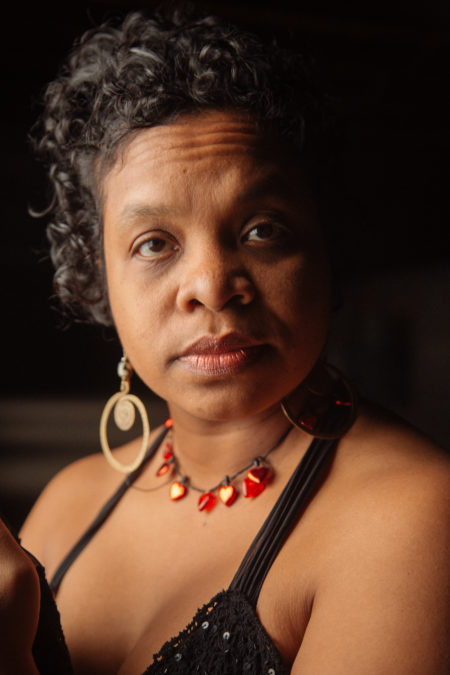
Mes de la Herencia Latinx: Milvia Berenice Pacheco Salvatierra
Mi nombre es Milvia Berenice Pacheco Salvatierra, soy una artista afro latina nacida y criada en Caracas-Venezuela. Las experiencias con el trauma a una edad temprana alimentaron en mí un impulso urgente hacia el movimiento. Mi primer contacto con el poder del movimiento como catalizador para la curación se produjo durante un proyecto de artes teatrales dirigido a los jóvenes de mi barrio, cuando tenía 13 años. Cuando cumplí los 18, estaba segura de que mi vocación era sanar a través del movimiento. Pasé a dedicar los siguientes años de mi vida a alcanzar la liberación a través del arte y el movimiento. En este viaje, me he convertido en bailarina, coreógrafa, intérprete, trabajadora corporal y organizadora comunitaria. Mi misión es servir como conducto para el empoderamiento para mí, mi familia y los demás, utilizando mi impulso urgente hacia el arte, el movimiento, la autoexpresión y la conciencia corporal como un instrumento de curación para alcanzar la liberación. En lugar de ser una víctima del pasado, continuaré profundizando la conexión con mis raíces para facilitar el proceso de sanación y ayudar a la comunidad afrodescendiente a encontrar formas sostenibles de compartir quiénes somos y reclamar una equidad en nuestra estructura social. Estoy comprometida a encarnar los valores de empatía, amor, integridad y colaboración para dar forma al camino de este viaje de equidad racial y paz interior personal. Vivo en Seattle desde 2012, donde también me convertí en madre. MÁS (Movimiento Afrolatino Seattle) se ha convertido en la plataforma donde continúo sirviendo como un conducto para el empoderamiento y más allá del empoderamiento para mí y para los demás.
¿Qué es para mi ser afrodescendiente?
Para mi nombrarme como una mujer Afrodescendiente, ha sido un proceso de autodescubrimiento de la esencia cultural no europea que habita en mí.
Nacida y criada en Venezuela, crecí hablando español como mi lengua materna, sin entender en profundidad qué en realidad es una lengua impuesta por los españoles en esos territorios. Aunque hablar español es una parte importante de mi identidad, que ejerzo con orgullo, que me conecta con la historia de un territorio y con comunidades hispanohablantes,que me ha ayudado a establecer sentido con el mundo; también es obvio que genera una conexión directa con esa herencia impuesta por los españoles. No es algo heredado de mis ancestros afro e indígenas. Así que nombrarme negra o mujer afrodescendiente para mí es decir que ando en la búsqueda de esas lenguas que perdí; que reconozco que mis ancestros entendieron y nombraron las cosas con un sentido diferente y que esa manera de nombrarlas todavía están presentes en mi cuerpo, y que puedo acceder a ellas cuando volteo la mirada hacia ese saber ancestral que yace en las tradiciones orales y culturales de las comunidades Afrodescendientes que continúan habitando en latinoamérica.
Decir que soy Afrodescendiente es decir que estoy consciente de la diversidad cultural que existe en nuestros territorios. Al nombrarme negra quiero sanar en mí la violencia ejercida por los procesos coloniales que hasta hoy continúan fomentando la inequidad racial y la anti- negritud en la sociedad. Nombrarme como una mujer Afrolatina me ayuda a entender esas intersecciones, pero nombrarme negra y afrodescendiente me ayuda a centrar la negritud como camino de reparación y sanación. Cuando digo soy negra y de Latinoamérica también digo que entiendo que soy parte de un grupo social que padece de múltiples discriminaciones, debido a las estrategias de control y explotación legal e institucionalizada en nuestras sociedades. Cuando digo soy Negra y de Latinoamérica es porque quiero crear visibilidad de mi negritud sin borrar las relaciones históricas y contextuales que me unen a latinoamérica y que han brindado maneras de entender el mundo al igual que maneras de ser percibida por el mundo.
También cuando digo que soy una mujer negra de latinoamérica es porque quiero celebrar y reivindicar en mi y en otros el valor del golpe del tambor, la negritud que abraza nuestros cuerpos y nos conecta con un sentido profundo de amor y orgullo por la familia, los ancestros y la tierra. Nombrarme afrodescendiente es también querer ir más allá de la inclusión social y reclamar nuestra independencia a través de la liberación de esos falsos estigmas que nos desvalorizan y facilitan la opresión. Es parir mas afrodescendientes y construir con ellos un nuevo concepto de Afrodescendencia.
Es sentirme en casa cuando saboreo arroz, caraotas, maíz o plátano, o cuando celebro San Juan bailando culo e’ puya.*
Es definitivamente y sobre todas las cosas el goce que siento al verme reflejada en “las caras lindas de mi gente negra.”**
* culo e’ puya: un ritmo afrovenezolano
** refiriéndose a la canción de salsa de Ismael Rivera
¿Qué, de dónde vengo?
Vengo del silencio puro y del estruendoso vientre de mi madre, que lloraba penas antiguas recordando la tierra del destierro y recordando el desamor.
Vengo del lugar de los sin tierras, de los despojados de sus etnias. Vengo de una historia vieja mal contada, donde las piezas que faltan no encajan con la mentira contada.
Vengo corriendo, a empujones, tropezando, divagando, y a veces caminando desde ese lugar. Yo Vengo arrastrando cadenas, recolectando polvo que poco a poco se vuelve tierra firme en mis pies cansados;
Vengo de la duda de la existencia, del maltrato, del abuso, de la ausencia…
Vengo escapando del lugar donde perdí la inocencia.
¿Qué, de dónde vengo?
Vengo del semen de mi padre y de su ausencia eterna.
¿Qué, de dónde vengo?
Vengo de mi madre, de mi padre y del sueño de mis ancestros.
¿Qué, de dónde vengo?
Vengo del agua clara, del amanecer que siempre da esperanza, de la lluvia que fertiliza la tierra.
Vengo de recorrer montañas, escondiendo miedos y regando flores.
Vengo con el latir del corazón replicando el sonido del tambor que resuena en mis caderas. Vengo de la mañana que aparece frondosa, con su aliento fresco, con su aire húmedo de madrugada, con su orquesta de grillos y su aroma de café colado.
Yo vengo al río para que me abra el camino de mi encuentro.
– Poema de Milvia Pacheco
